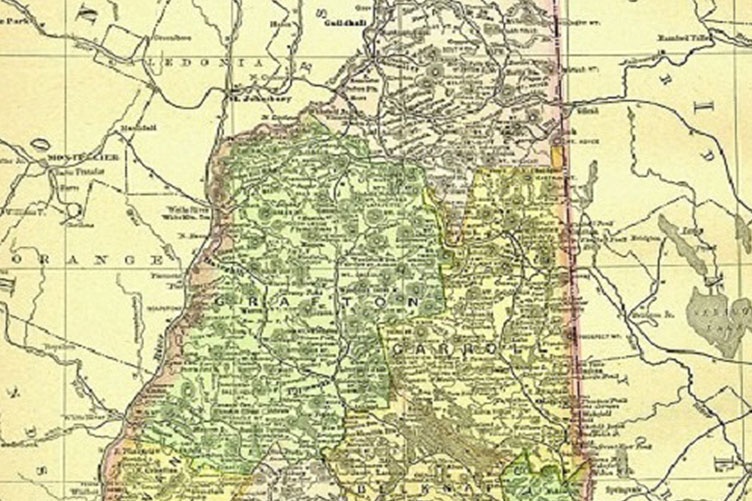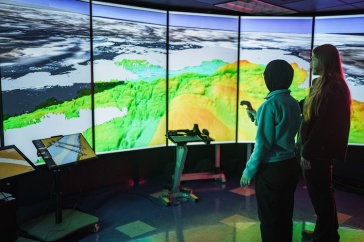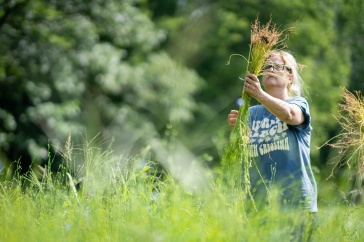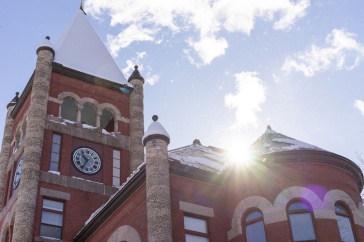
895 Railroad Map of New Hampshire by Brian Swan, Attribution (CC By 2.0), May 3, 2009
Five faculty members in COLA will receive funding of between $5,000 and $10,000 for research projects aligned with the mission of The James H. Hayes and Clare Short Hayes Chair in the Humanities. James H. Hayes was a colorful UNH alumnus, a successful New Hampshire businessman, a generous philanthropist and a civic leader devoted to New Hampshire politics and traditions who endowed a faculty chair in the Humanities at the University of New Hampshire to “concentrate on New Hampshire’s history, culture and government.” The Center is proud to help facilitate projects that document important forgotten pieces of the state’s history and that expand our understanding of New Hampshire today. Much of the supported research by this cohort of Hayes Fellows is being undertaken in direct collaboration with community partners and members, with a demonstrated benefit to the public, or on digital platforms that will make the research broadly accessible and interactive.
Support has been awarded to the following faculty and projects:

Kimberly Alexander (history) for Growing Flax, Processing Linen, and Making Clothes: A New Hampshire Fiber Staple for a Sustainable Future. Spun off from an idea raised in her HIST600/800 class, "From Homespun to Fast Fashion: A Global History of Textiles,” this project will feature a partnership with Extension Professor Becky Sideman from UNH’s sustainable agriculture program, and undergraduate and graduate students from the class, to experiment with growing flax, cotton and rye in a plot at the Woodman Horticultural Research Farm. Alexander and her students will use the Lane Family papers, held at the New Hampshire Historical Society, as well as additional materials held at the Stratham Historical Society, the Newmarket Historical Society and the Portsmouth Athenaeum, as the primary historic references for how flax was grown, harvested, produced, bartered and sold, as well as the basis for research on the roles of women (both family and extended kinship networks) and the rural enslaved in production of this household staple. The project will also include a Seacoast textile tour on Clio and ties into Alexander’s extended research into New Hampshire’s pre-industrial, rural based textile economy.

Renee Heath (communication) for Beyond Demographic Representation: Impact of Indigenous Participants on Discussions of Environmental Priorities for New Hampshire’s Seacoast. In 2022, students, scientists, policy advocates and Indigenous persons from the Seacoast area participated in a public facilitated discussion on values and priorities around water and local estuaries in southern New Hampshire. Using comparative data, the analysis phase of the research asks: What impact, if any, did including Indigenous participants at the table have on discussions? It will use qualitative data of recorded discussions to examine the impact inclusion makes on public dialogue and will help guide theory and practice in public policy on diversity, equity, and inclusion. Heath, who co-directs UNH’s Civil Discourse Lab, specializes in ethnographic and qualitative methods and analysis. She has been studying dialogue in public decision-making groups for two decades.

Liz Mellyn (history) for New Hampshire Hospital Digital Humanities Project, which will collect and digitize historical materials related to the New Hampshire Hospital and build a user-friendly online interface that will put these rich archival sources within the immediate reach of students, teachers, scholars and the public. Founded in 1842 and closed in 1989, this “ghost both in Concord’s civic landscape and in New Hampshire’s historical record” was a key early actor in a national asylum building revolution as well as one of New Hampshire’s most important experiments in social welfare and mental healthcare. The project will be co-directed by Catherine Winters of NH Humanities and advised by Paul Shagoury, emeritus director of psychology at New Hampshire Hospital. Partners from New Hampshire Historical Society and Breene Memorial Library at the New Hampshire Hospital will consult on the project. In addition to preserving, reconstructing and disseminating the complicated history of the New Hampshire Hospital for those in the Granite State and beyond, the project will also encourage its users to think critically and historically about mental health and mental healthcare in America’s past, present and future.

Dante Scala (political science) for Pathways to Leadership: Legislators’ Emergence in the State of New Hampshire, which will look at the pathways citizens of New Hampshire take to join the state legislature. Using a novel dataset of new Granite State legislators, the project will respond to the overarching query: Are politics still local in New Hampshire? Historically, the fact that many legislative districts are comprised of just a few thousand voters creates an intensely local brand of politics, in which legislators are quite close to their constituents and held accountable to a correspondingly high degree. However, data suggests that the newest generation of New Hampshire state legislators is less grounded in the local and more inspired to participate by the national ideological battles that rage from coast to coast. The Hayes-funded portion of this larger inquiry will expand the dataset, prepare an academic paper for presentation at the 2024 New England Political Science Association annual meeting (as well as publication in academic journals) and present data and a brief to the Carsey School of Public Policy, UNH’s library and local public groups.

Bethany Silva (education) for Multilingual Book Clubs: Connecting Communities Through Literature and Language, which leverages three community groups — the Community Literacy Center (CLC), Dover Adult Learning Center (DALC) and the Dover Public Library (DPL) — to support multilingual individuals in preparing read-alouds that celebrate our region’s oft-hidden linguistic diversity; enact a multilingual book club that engages with literature in ways that are culturally relevant to the speakers of each week’s featured languages; and develop a digital bookshelf that educators and caregivers can use to support their own multilingual book clubs and read-alouds. Hayes funding will support two academic-year ESL courses for adults at DALC in conjunction with two Book to Art series hosted at the DPL. Project leaders will also gather digital artifacts, read-alouds and testimonials to add to the digital bookshelf. The project will be co-led by Emilie Coppinger, currently graduate assistant for the CLC and a Ph.D. candidate in UNH’s Department of Education, specializing in children and youth in communities.
-
Written By:
Katie Umans | UNH Center for the Humanities | katie.umans@unh.edu | 603-862-4356

















































